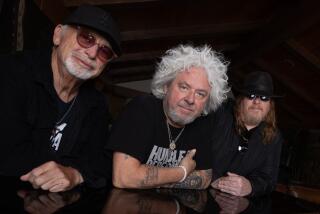Music at Its Most Bass-ic : Deep, Danceable Guitar Lines Color Kotoja’s Optimistic Themes
- Share via
SAN JUAN CAPISTRANO — Few American kids grow up thinking of the bass guitar as the centerpiece of a band. More likely, they want to emulate charismatic singers such as Robert Plant or Eddie Vedder, or famous lead guitarists such as Pete Townshend. But for World Music purveyor-singer-songwriter Ken Okulolo, the power of every vocal yell and guitar lick depends on the mastery of one instrument.
“The bass brings a sense of stability and groundedness to a band. It’s truly the key ingredient, I believe,” Okulolo said on the phone recently from Oakland, where he has lived since he moved from Nigeria 12 years ago. He brings his nine-piece band, Kotoja, to the San Juan Capistrano Regional Library on Saturday night for two shows.
An award-winning bassist who has played with juju great King Sunny Ade, Okulolo grew up surrounded by music in the West African village of Aladja. At an early age, he played bells, shakers and a variety of percussive instruments at weddings, funerals and frequent storytelling sessions.
He was introduced to the guitar by a cousin, but because he has short fingers, Okulolo learned to use only the top four strings. It didn’t take him long to realize that “the bass was where it was at for me.”
His approach to playing emphasizes economy and restraint. “You cannot overplay the bass or it upsets the band’s dynamic of balance. . . . Every instrument has a part to play in the overall sound. [The bass] forms the glue that holds all the other elements of the music together.”
Of course, there is more to Kotoja’s world music--an appealing blend of elements including juju, jazz, soul and funk--than Okulolo’s slinky, dance-inducing bass lines. Rich vocal harmonies and Tower of Power-like horns bring a celebratory joy to the party.
Kotoja (a Nigerian word meaning “let’s be friends”) has captured this good-time vibe on several recordings; the most representative are 1992’s “Sawale” (Mesa/Bluemoon) and a compilation, “The Super Sawale Collection” (Putumayo World Music), released in 1994. Okulolo says the band is working on a “folksier, funkier-sounding” album for release in the fall.
Meanwhile, Kotoja has been touring worldwide, and in an age when contemporary pop music--particularly rap, grunge and punk-rock--lashes out with rage and disillusionment, Okulolo’s optimistic, life-affirming themes of community, brotherhood and family (he and his wife have been married 10 years and have three children) are as refreshing as an oasis in the desert.
He remains open-minded, even positive, when discussing music fueled by anger and bitterness.
“There’s no limitation as to who and what I listen to. It all has something to offer,” he said, citing indigenous Congo music and James Brown and Wilson Pickett among his musical influences. “The public needs to draw something positive from music that is mean-spirited and look at ways to eradicate that negativity. An angry man is a hungry man, and you have to find a medium to express what’s missing in your heart. That ache needs a voice, too.
“I believe life is a never-ending cycle filled with laughter as well as struggles and tears,” he continued. “We need music to grow as human beings. It’s very good medicine and nurtures your spiritual self. By being open, friendly and positive toward everything you encounter in life, you will grow spiritually. That’s what the music of Kotoja is all about.”
With such song titles as “Be My Friend” and “Save the World for Our Children,” is Okulolo concerned that Kotoja’s idealism will be seen as mere sloganeering? “My music is very simple because you don’t have to preach to be heard. Just one line delivered with conviction and honesty makes an impression,” he answered.
“You do have to offer a combination of music and lyrics that will touch someone’s heart and free their feet. I think people welcome our message, but it’s the rhythms that drive everybody crazy!”
* Kotoja plays Saturday in the courtyard of the San Juan Capistrano Regional Library, 31495 El Camino Real. 7 and 9 p.m. $3-$6. (714) 248-7469.
More to Read
The biggest entertainment stories
Get our big stories about Hollywood, film, television, music, arts, culture and more right in your inbox as soon as they publish.
You may occasionally receive promotional content from the Los Angeles Times.










